

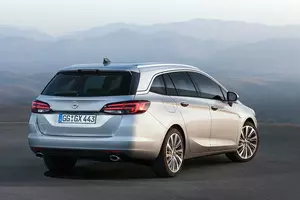
2015 Astra Mk VII Sports Tourer
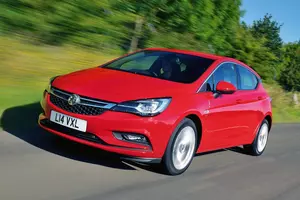
2015 Astra Mk VII
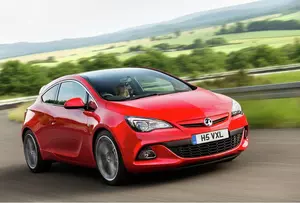
2011 Astra Mk VI GTC
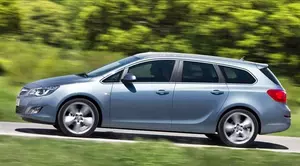
2010 Astra Mk VI Sports Tourer
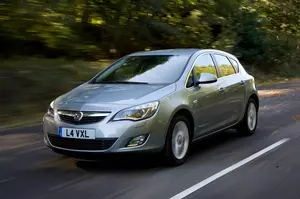
2009 Astra Mk VI CC
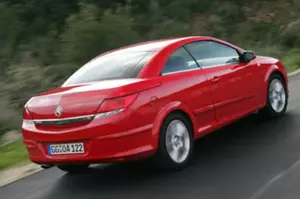
2006 Astra Mk V Convertible
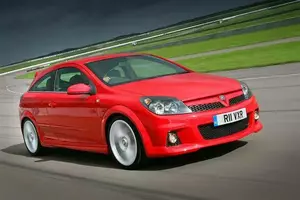
2005 Astra Mk V CC Sport Hatch
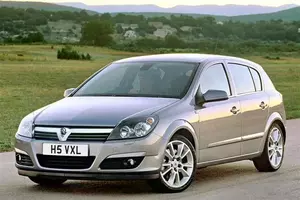
2004 Astra Mk V CC
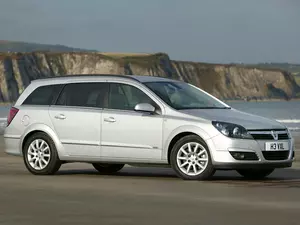
2004 Astra Mk V Estate
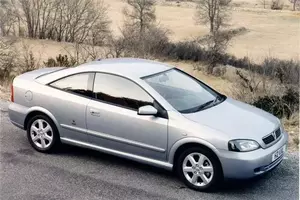
2002 Astra Mk IV Coupe
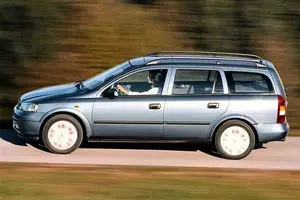
1998 Astra Mk IV Estate
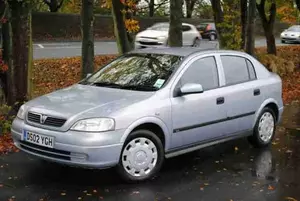
1998 Astra Mk IV
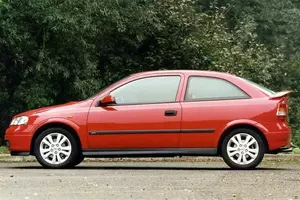
1998 Astra Mk IV CC
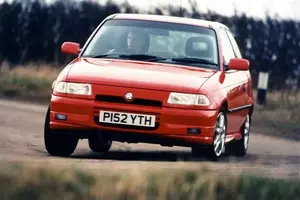
1991 Astra Mk III
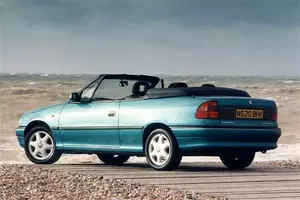
1993 Astra Mk III Convertible

1991 Astra Mk III Estate
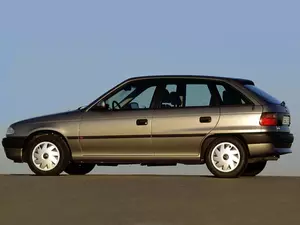
1991 Astra Mk III CC
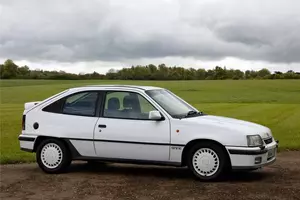
1984 Astra Mk II CC

1987 Astra Mk II Convertible

1985 Astra Mk II Belmont

1984 Astra Mk II Estate

| Vehicle | Curb weight | Difference from world's smallest | Weight to power ratio | 0—60 mph acceleration ratio | Consumption ratio |
|---|---|---|---|---|---|
| 1.6 CDTi |
1350 kg / 2977 lbs |
925 kg (2040 lbs) heavier | 10 kg to 1 hp | 141 kg/s (311 lbs/s) |
300 kg/L (662 lbs/L) |
| 1.4 |
1198 kg / 2642 lbs |
773 kg (1705 lbs) heavier | 12 kg to 1 hp | 91 kg/s (201 lbs/s) |
218 kg/L (481 lbs/L) |
| 1.6 EcoTec |
1318 kg / 2906 lbs |
893 kg (1969 lbs) heavier | 7 kg to 1 hp | 181 kg/s (399 lbs/s) |
213 kg/L (470 lbs/L) |
| 1.4 EcoTec |
1247 kg / 2750 lbs |
822 kg (1813 lbs) heavier | 10 kg to 1 hp | 137 kg/s (302 lbs/s) |
223 kg/L (492 lbs/L) |
| 1.0i |
1198 kg / 2642 lbs |
773 kg (1705 lbs) heavier | 11 kg to 1 hp | 108 kg/s (238 lbs/s) |
266 kg/L (587 lbs/L) |
| Vehicle | 1.6 CDTi |
|---|---|
| Curb weight |
1350 kg / 2977 lbs |
| Difference from world's smallest | 925 kg (925 lbs) heavier |
| Weight to power ratio | 10 kg to 1 hp |
| 0—60 mph acceleration ratio | 141 kg/s (311 lbs/s) |
| Consumption ratio |
300 kg/L (662 lbs/L) |
| Vehicle | 1.4 |
| Curb weight |
1198 kg / 2642 lbs |
| Difference from world's smallest | 773 kg (773 lbs) heavier |
| Weight to power ratio | 12 kg to 1 hp |
| 0—60 mph acceleration ratio | 91 kg/s (201 lbs/s) |
| Consumption ratio |
218 kg/L (481 lbs/L) |
| Vehicle | 1.6 EcoTec |
| Curb weight |
1318 kg / 2906 lbs |
| Difference from world's smallest | 893 kg (893 lbs) heavier |
| Weight to power ratio | 7 kg to 1 hp |
| 0—60 mph acceleration ratio | 181 kg/s (399 lbs/s) |
| Consumption ratio |
213 kg/L (470 lbs/L) |
| Vehicle | 1.4 EcoTec |
| Curb weight |
1247 kg / 2750 lbs |
| Difference from world's smallest | 822 kg (822 lbs) heavier |
| Weight to power ratio | 10 kg to 1 hp |
| 0—60 mph acceleration ratio | 137 kg/s (302 lbs/s) |
| Consumption ratio |
223 kg/L (492 lbs/L) |
| Vehicle | 1.0i |
| Curb weight |
1198 kg / 2642 lbs |
| Difference from world's smallest | 773 kg (773 lbs) heavier |
| Weight to power ratio | 11 kg to 1 hp |
| 0—60 mph acceleration ratio | 108 kg/s (238 lbs/s) |
| Consumption ratio |
266 kg/L (587 lbs/L) |

| Vehicle | Curb weight | Difference from world's smallest | Weight to power ratio | 0—60 mph acceleration ratio | Consumption ratio |
|---|---|---|---|---|---|
| 1.0 EcoTec |
1198 kg / 2642 lbs |
773 kg (1705 lbs) heavier | 11 kg to 1 hp | 113 kg/s (249 lbs/s) |
272 kg/L (600 lbs/L) |
| 1.6 CDTi |
1350 kg / 2977 lbs |
925 kg (2040 lbs) heavier | 10 kg to 1 hp | 148 kg/s (326 lbs/s) |
346 kg/L (763 lbs/L) |
| 1.4 EcoTec |
1203 kg / 2653 lbs |
778 kg (1716 lbs) heavier | 10 kg to 1 hp | 138 kg/s (304 lbs/s) |
219 kg/L (483 lbs/L) |
| 1.6 EcoTec |
1275 kg / 2811 lbs |
850 kg (1874 lbs) heavier | 6 kg to 1 hp | 190 kg/s (419 lbs/s) |
209 kg/L (461 lbs/L) |
| 1.4 |
1169 kg / 2578 lbs |
744 kg (1641 lbs) heavier | 12 kg to 1 hp | 100 kg/s (221 lbs/s) |
221 kg/L (487 lbs/L) |
| Vehicle | 1.0 EcoTec |
|---|---|
| Curb weight |
1198 kg / 2642 lbs |
| Difference from world's smallest | 773 kg (773 lbs) heavier |
| Weight to power ratio | 11 kg to 1 hp |
| 0—60 mph acceleration ratio | 113 kg/s (249 lbs/s) |
| Consumption ratio |
272 kg/L (600 lbs/L) |
| Vehicle | 1.6 CDTi |
| Curb weight |
1350 kg / 2977 lbs |
| Difference from world's smallest | 925 kg (925 lbs) heavier |
| Weight to power ratio | 10 kg to 1 hp |
| 0—60 mph acceleration ratio | 148 kg/s (326 lbs/s) |
| Consumption ratio |
346 kg/L (763 lbs/L) |
| Vehicle | 1.4 EcoTec |
| Curb weight |
1203 kg / 2653 lbs |
| Difference from world's smallest | 778 kg (778 lbs) heavier |
| Weight to power ratio | 10 kg to 1 hp |
| 0—60 mph acceleration ratio | 138 kg/s (304 lbs/s) |
| Consumption ratio |
219 kg/L (483 lbs/L) |
| Vehicle | 1.6 EcoTec |
| Curb weight |
1275 kg / 2811 lbs |
| Difference from world's smallest | 850 kg (850 lbs) heavier |
| Weight to power ratio | 6 kg to 1 hp |
| 0—60 mph acceleration ratio | 190 kg/s (419 lbs/s) |
| Consumption ratio |
209 kg/L (461 lbs/L) |
| Vehicle | 1.4 |
| Curb weight |
1169 kg / 2578 lbs |
| Difference from world's smallest | 744 kg (744 lbs) heavier |
| Weight to power ratio | 12 kg to 1 hp |
| 0—60 mph acceleration ratio | 100 kg/s (221 lbs/s) |
| Consumption ratio |
221 kg/L (487 lbs/L) |

| Vehicle | Curb weight | Difference from world's smallest | Weight to power ratio | 0—60 mph acceleration ratio | Consumption ratio |
|---|---|---|---|---|---|
| 1.4 EcoFLEX |
1321 kg / 2913 lbs |
896 kg (1976 lbs) heavier | 11 kg to 1 hp | 133 kg/s (293 lbs/s) |
224 kg/L (494 lbs/L) |
| 2.0 CDTi |
1321 kg / 2913 lbs |
896 kg (1976 lbs) heavier | 8 kg to 1 hp | 155 kg/s (342 lbs/s) |
275 kg/L (606 lbs/L) |
| VXR 2.0i |
1404 kg / 3096 lbs |
979 kg (2159 lbs) heavier | 5 kg to 1 hp | 251 kg/s (553 lbs/s) |
173 kg/L (381 lbs/L) |
| 1.7 CDTi |
1321 kg / 2913 lbs |
896 kg (1976 lbs) heavier | 10 kg to 1 hp | 128 kg/s (282 lbs/s) |
294 kg/L (648 lbs/L) |
| 1.6 |
1321 kg / 2913 lbs |
896 kg (1976 lbs) heavier | 7 kg to 1 hp | 141 kg/s (311 lbs/s) |
169 kg/L (373 lbs/L) |
| Vehicle | 1.4 EcoFLEX |
|---|---|
| Curb weight |
1321 kg / 2913 lbs |
| Difference from world's smallest | 896 kg (896 lbs) heavier |
| Weight to power ratio | 11 kg to 1 hp |
| 0—60 mph acceleration ratio | 133 kg/s (293 lbs/s) |
| Consumption ratio |
224 kg/L (494 lbs/L) |
| Vehicle | 2.0 CDTi |
| Curb weight |
1321 kg / 2913 lbs |
| Difference from world's smallest | 896 kg (896 lbs) heavier |
| Weight to power ratio | 8 kg to 1 hp |
| 0—60 mph acceleration ratio | 155 kg/s (342 lbs/s) |
| Consumption ratio |
275 kg/L (606 lbs/L) |
| Vehicle | VXR 2.0i |
| Curb weight |
1404 kg / 3096 lbs |
| Difference from world's smallest | 979 kg (979 lbs) heavier |
| Weight to power ratio | 5 kg to 1 hp |
| 0—60 mph acceleration ratio | 251 kg/s (553 lbs/s) |
| Consumption ratio |
173 kg/L (381 lbs/L) |
| Vehicle | 1.7 CDTi |
| Curb weight |
1321 kg / 2913 lbs |
| Difference from world's smallest | 896 kg (896 lbs) heavier |
| Weight to power ratio | 10 kg to 1 hp |
| 0—60 mph acceleration ratio | 128 kg/s (282 lbs/s) |
| Consumption ratio |
294 kg/L (648 lbs/L) |
| Vehicle | 1.6 |
| Curb weight |
1321 kg / 2913 lbs |
| Difference from world's smallest | 896 kg (896 lbs) heavier |
| Weight to power ratio | 7 kg to 1 hp |
| 0—60 mph acceleration ratio | 141 kg/s (311 lbs/s) |
| Consumption ratio |
169 kg/L (373 lbs/L) |

| Vehicle | Curb weight | Difference from world's smallest | Weight to power ratio | 0—60 mph acceleration ratio | Consumption ratio |
|---|---|---|---|---|---|
| 1.4 VVT |
1350 kg / 2977 lbs |
925 kg (2040 lbs) heavier | 10 kg to 1 hp | 136 kg/s (300 lbs/s) |
221 kg/L (487 lbs/L) |
| 1.3 CDTI |
1393 kg / 3072 lbs |
968 kg (2135 lbs) heavier | 15 kg to 1 hp | 100 kg/s (221 lbs/s) |
340 kg/L (750 lbs/L) |
| 1.6 CDTi |
1503 kg / 3314 lbs |
1078 kg (2377 lbs) heavier | 11 kg to 1 hp | 163 kg/s (359 lbs/s) |
385 kg/L (849 lbs/L) |
| 1.6i |
1503 kg / 3314 lbs |
1078 kg (2377 lbs) heavier | 8 kg to 1 hp | 179 kg/s (395 lbs/s) |
203 kg/L (448 lbs/L) |
| 1.6 VVT |
1340 kg / 2955 lbs |
915 kg (2018 lbs) heavier | 12 kg to 1 hp | 115 kg/s (254 lbs/s) |
200 kg/L (441 lbs/L) |
| 1.7 CDTI |
1960 kg / 4322 lbs |
1535 kg (3385 lbs) heavier | 18 kg to 1 hp | 158 kg/s (348 lbs/s) |
436 kg/L (961 lbs/L) |
| 2.0 CDTI |
1393 kg / 3072 lbs |
968 kg (2135 lbs) heavier | 9 kg to 1 hp | 155 kg/s (342 lbs/s) |
273 kg/L (602 lbs/L) |
| Vehicle | 1.4 VVT |
|---|---|
| Curb weight |
1350 kg / 2977 lbs |
| Difference from world's smallest | 925 kg (925 lbs) heavier |
| Weight to power ratio | 10 kg to 1 hp |
| 0—60 mph acceleration ratio | 136 kg/s (300 lbs/s) |
| Consumption ratio |
221 kg/L (487 lbs/L) |
| Vehicle | 1.3 CDTI |
| Curb weight |
1393 kg / 3072 lbs |
| Difference from world's smallest | 968 kg (968 lbs) heavier |
| Weight to power ratio | 15 kg to 1 hp |
| 0—60 mph acceleration ratio | 100 kg/s (221 lbs/s) |
| Consumption ratio |
340 kg/L (750 lbs/L) |
| Vehicle | 1.6 CDTi |
| Curb weight |
1503 kg / 3314 lbs |
| Difference from world's smallest | 1078 kg (1078 lbs) heavier |
| Weight to power ratio | 11 kg to 1 hp |
| 0—60 mph acceleration ratio | 163 kg/s (359 lbs/s) |
| Consumption ratio |
385 kg/L (849 lbs/L) |
| Vehicle | 1.6i |
| Curb weight |
1503 kg / 3314 lbs |
| Difference from world's smallest | 1078 kg (1078 lbs) heavier |
| Weight to power ratio | 8 kg to 1 hp |
| 0—60 mph acceleration ratio | 179 kg/s (395 lbs/s) |
| Consumption ratio |
203 kg/L (448 lbs/L) |
| Vehicle | 1.6 VVT |
| Curb weight |
1340 kg / 2955 lbs |
| Difference from world's smallest | 915 kg (915 lbs) heavier |
| Weight to power ratio | 12 kg to 1 hp |
| 0—60 mph acceleration ratio | 115 kg/s (254 lbs/s) |
| Consumption ratio |
200 kg/L (441 lbs/L) |
| Vehicle | 1.7 CDTI |
| Curb weight |
1960 kg / 4322 lbs |
| Difference from world's smallest | 1535 kg (1535 lbs) heavier |
| Weight to power ratio | 18 kg to 1 hp |
| 0—60 mph acceleration ratio | 158 kg/s (348 lbs/s) |
| Consumption ratio |
436 kg/L (961 lbs/L) |
| Vehicle | 2.0 CDTI |
| Curb weight |
1393 kg / 3072 lbs |
| Difference from world's smallest | 968 kg (968 lbs) heavier |
| Weight to power ratio | 9 kg to 1 hp |
| 0—60 mph acceleration ratio | 155 kg/s (342 lbs/s) |
| Consumption ratio |
273 kg/L (602 lbs/L) |

| Vehicle | Curb weight | Difference from world's smallest | Weight to power ratio | 0—60 mph acceleration ratio | Consumption ratio |
|---|---|---|---|---|---|
| 1.4 EcoFLEX |
1288 kg / 2840 lbs |
863 kg (1903 lbs) heavier | 15 kg to 1 hp | 92 kg/s (203 lbs/s) |
234 kg/L (516 lbs/L) |
| 1.7 CDTi |
1403 kg / 3094 lbs |
978 kg (2157 lbs) heavier | 11 kg to 1 hp | 129 kg/s (284 lbs/s) |
299 kg/L (659 lbs/L) |
| 1.6 Ecotec |
1305 kg / 2878 lbs |
880 kg (1941 lbs) heavier | 11 kg to 1 hp | 106 kg/s (234 lbs/s) |
186 kg/L (410 lbs/L) |
| 1.4 Ecotec |
1308 kg / 2884 lbs |
883 kg (1947 lbs) heavier | 9 kg to 1 hp | 142 kg/s (313 lbs/s) |
222 kg/L (490 lbs/L) |
| 1.6 CDTi |
1403 kg / 3094 lbs |
978 kg (2157 lbs) heavier | 10 kg to 1 hp | 148 kg/s (326 lbs/s) |
360 kg/L (794 lbs/L) |
| Vehicle | 1.4 EcoFLEX |
|---|---|
| Curb weight |
1288 kg / 2840 lbs |
| Difference from world's smallest | 863 kg (863 lbs) heavier |
| Weight to power ratio | 15 kg to 1 hp |
| 0—60 mph acceleration ratio | 92 kg/s (203 lbs/s) |
| Consumption ratio |
234 kg/L (516 lbs/L) |
| Vehicle | 1.7 CDTi |
| Curb weight |
1403 kg / 3094 lbs |
| Difference from world's smallest | 978 kg (978 lbs) heavier |
| Weight to power ratio | 11 kg to 1 hp |
| 0—60 mph acceleration ratio | 129 kg/s (284 lbs/s) |
| Consumption ratio |
299 kg/L (659 lbs/L) |
| Vehicle | 1.6 Ecotec |
| Curb weight |
1305 kg / 2878 lbs |
| Difference from world's smallest | 880 kg (880 lbs) heavier |
| Weight to power ratio | 11 kg to 1 hp |
| 0—60 mph acceleration ratio | 106 kg/s (234 lbs/s) |
| Consumption ratio |
186 kg/L (410 lbs/L) |
| Vehicle | 1.4 Ecotec |
| Curb weight |
1308 kg / 2884 lbs |
| Difference from world's smallest | 883 kg (883 lbs) heavier |
| Weight to power ratio | 9 kg to 1 hp |
| 0—60 mph acceleration ratio | 142 kg/s (313 lbs/s) |
| Consumption ratio |
222 kg/L (490 lbs/L) |
| Vehicle | 1.6 CDTi |
| Curb weight |
1403 kg / 3094 lbs |
| Difference from world's smallest | 978 kg (978 lbs) heavier |
| Weight to power ratio | 10 kg to 1 hp |
| 0—60 mph acceleration ratio | 148 kg/s (326 lbs/s) |
| Consumption ratio |
360 kg/L (794 lbs/L) |

| Vehicle | Curb weight | Difference from world's smallest | Weight to power ratio | 0—60 mph acceleration ratio | Consumption ratio |
|---|---|---|---|---|---|
| 1.9 CDTi |
1656 kg / 3651 lbs |
1231 kg (2714 lbs) heavier | 11 kg to 1 hp | 184 kg/s (406 lbs/s) |
276 kg/L (609 lbs/L) |
| 1.6 |
1440 kg / 3175 lbs |
1015 kg (2238 lbs) heavier | 14 kg to 1 hp | 122 kg/s (269 lbs/s) |
209 kg/L (461 lbs/L) |
| 2.0 |
1645 kg / 3627 lbs |
1220 kg (2690 lbs) heavier | 8 kg to 1 hp | 208 kg/s (459 lbs/s) |
173 kg/L (381 lbs/L) |
| 1.8 |
1570 kg / 3462 lbs |
1145 kg (2525 lbs) heavier | 11 kg to 1 hp | 130 kg/s (287 lbs/s) |
194 kg/L (428 lbs/L) |
| Vehicle | 1.9 CDTi |
|---|---|
| Curb weight |
1656 kg / 3651 lbs |
| Difference from world's smallest | 1231 kg (1231 lbs) heavier |
| Weight to power ratio | 11 kg to 1 hp |
| 0—60 mph acceleration ratio | 184 kg/s (406 lbs/s) |
| Consumption ratio |
276 kg/L (609 lbs/L) |
| Vehicle | 1.6 |
| Curb weight |
1440 kg / 3175 lbs |
| Difference from world's smallest | 1015 kg (1015 lbs) heavier |
| Weight to power ratio | 14 kg to 1 hp |
| 0—60 mph acceleration ratio | 122 kg/s (269 lbs/s) |
| Consumption ratio |
209 kg/L (461 lbs/L) |
| Vehicle | 2.0 |
| Curb weight |
1645 kg / 3627 lbs |
| Difference from world's smallest | 1220 kg (1220 lbs) heavier |
| Weight to power ratio | 8 kg to 1 hp |
| 0—60 mph acceleration ratio | 208 kg/s (459 lbs/s) |
| Consumption ratio |
173 kg/L (381 lbs/L) |
| Vehicle | 1.8 |
| Curb weight |
1570 kg / 3462 lbs |
| Difference from world's smallest | 1145 kg (1145 lbs) heavier |
| Weight to power ratio | 11 kg to 1 hp |
| 0—60 mph acceleration ratio | 130 kg/s (287 lbs/s) |
| Consumption ratio |
194 kg/L (428 lbs/L) |

| Vehicle | Curb weight | Difference from world's smallest | Weight to power ratio | 0—60 mph acceleration ratio | Consumption ratio |
|---|---|---|---|---|---|
| 1.7 CDTi |
1297 kg / 2860 lbs |
872 kg (1923 lbs) heavier | 13 kg to 1 hp | 120 kg/s (265 lbs/s) |
259 kg/L (571 lbs/L) |
| 1.9 CDTi |
1342 kg / 2959 lbs |
917 kg (2022 lbs) heavier | 11 kg to 1 hp | 146 kg/s (322 lbs/s) |
231 kg/L (509 lbs/L) |
| 1.8 VVT 16V |
1222 kg / 2695 lbs |
797 kg (1758 lbs) heavier | 9 kg to 1 hp | 137 kg/s (302 lbs/s) |
167 kg/L (368 lbs/L) |
| 2.0i |
1302 kg / 2871 lbs |
877 kg (1934 lbs) heavier | 8 kg to 1 hp | 174 kg/s (384 lbs/s) |
145 kg/L (320 lbs/L) |
| 1.4i 16V |
1180 kg / 2602 lbs |
755 kg (1665 lbs) heavier | 13 kg to 1 hp | 98 kg/s (216 lbs/s) |
187 kg/L (412 lbs/L) |
| 1.8i |
1240 kg / 2734 lbs |
815 kg (1797 lbs) heavier | 10 kg to 1 hp | 112 kg/s (247 lbs/s) |
151 kg/L (333 lbs/L) |
| 1.6i 16V |
1230 kg / 2712 lbs |
805 kg (1775 lbs) heavier | 12 kg to 1 hp | 98 kg/s (216 lbs/s) |
189 kg/L (417 lbs/L) |
| 1.6i |
1302 kg / 2871 lbs |
877 kg (1934 lbs) heavier | 7 kg to 1 hp | 178 kg/s (392 lbs/s) |
169 kg/L (373 lbs/L) |
| Vehicle | 1.7 CDTi |
|---|---|
| Curb weight |
1297 kg / 2860 lbs |
| Difference from world's smallest | 872 kg (872 lbs) heavier |
| Weight to power ratio | 13 kg to 1 hp |
| 0—60 mph acceleration ratio | 120 kg/s (265 lbs/s) |
| Consumption ratio |
259 kg/L (571 lbs/L) |
| Vehicle | 1.9 CDTi |
| Curb weight |
1342 kg / 2959 lbs |
| Difference from world's smallest | 917 kg (917 lbs) heavier |
| Weight to power ratio | 11 kg to 1 hp |
| 0—60 mph acceleration ratio | 146 kg/s (322 lbs/s) |
| Consumption ratio |
231 kg/L (509 lbs/L) |
| Vehicle | 1.8 VVT 16V |
| Curb weight |
1222 kg / 2695 lbs |
| Difference from world's smallest | 797 kg (797 lbs) heavier |
| Weight to power ratio | 9 kg to 1 hp |
| 0—60 mph acceleration ratio | 137 kg/s (302 lbs/s) |
| Consumption ratio |
167 kg/L (368 lbs/L) |
| Vehicle | 2.0i |
| Curb weight |
1302 kg / 2871 lbs |
| Difference from world's smallest | 877 kg (877 lbs) heavier |
| Weight to power ratio | 8 kg to 1 hp |
| 0—60 mph acceleration ratio | 174 kg/s (384 lbs/s) |
| Consumption ratio |
145 kg/L (320 lbs/L) |
| Vehicle | 1.4i 16V |
| Curb weight |
1180 kg / 2602 lbs |
| Difference from world's smallest | 755 kg (755 lbs) heavier |
| Weight to power ratio | 13 kg to 1 hp |
| 0—60 mph acceleration ratio | 98 kg/s (216 lbs/s) |
| Consumption ratio |
187 kg/L (412 lbs/L) |
| Vehicle | 1.8i |
| Curb weight |
1240 kg / 2734 lbs |
| Difference from world's smallest | 815 kg (815 lbs) heavier |
| Weight to power ratio | 10 kg to 1 hp |
| 0—60 mph acceleration ratio | 112 kg/s (247 lbs/s) |
| Consumption ratio |
151 kg/L (333 lbs/L) |
| Vehicle | 1.6i 16V |
| Curb weight |
1230 kg / 2712 lbs |
| Difference from world's smallest | 805 kg (805 lbs) heavier |
| Weight to power ratio | 12 kg to 1 hp |
| 0—60 mph acceleration ratio | 98 kg/s (216 lbs/s) |
| Consumption ratio |
189 kg/L (417 lbs/L) |
| Vehicle | 1.6i |
| Curb weight |
1302 kg / 2871 lbs |
| Difference from world's smallest | 877 kg (877 lbs) heavier |
| Weight to power ratio | 7 kg to 1 hp |
| 0—60 mph acceleration ratio | 178 kg/s (392 lbs/s) |
| Consumption ratio |
169 kg/L (373 lbs/L) |

| Vehicle | Curb weight | Difference from world's smallest | Weight to power ratio | 0—60 mph acceleration ratio | Consumption ratio |
|---|---|---|---|---|---|
| 1.4 |
1165 kg / 2569 lbs |
740 kg (1632 lbs) heavier | 13 kg to 1 hp | 90 kg/s (198 lbs/s) |
185 kg/L (408 lbs/L) |
| 2.0 |
1322 kg / 2915 lbs |
897 kg (1978 lbs) heavier | 8 kg to 1 hp | 172 kg/s (379 lbs/s) |
147 kg/L (324 lbs/L) |
| 1.3 CDTi |
1278 kg / 2818 lbs |
853 kg (1881 lbs) heavier | 14 kg to 1 hp | 98 kg/s (216 lbs/s) |
266 kg/L (587 lbs/L) |
| 1.6 |
1195 kg / 2635 lbs |
770 kg (1698 lbs) heavier | 11 kg to 1 hp | 95 kg/s (209 lbs/s) |
184 kg/L (406 lbs/L) |
| 1.8 |
1203 kg / 2653 lbs |
778 kg (1716 lbs) heavier | 10 kg to 1 hp | 115 kg/s (254 lbs/s) |
163 kg/L (359 lbs/L) |
| 1.8 VVT 16V |
1226 kg / 2703 lbs |
801 kg (1766 lbs) heavier | 9 kg to 1 hp | 136 kg/s (300 lbs/s) |
168 kg/L (370 lbs/L) |
| 1.7 CDTi |
1317 kg / 2904 lbs |
892 kg (1967 lbs) heavier | 13 kg to 1 hp | 121 kg/s (267 lbs/s) |
269 kg/L (593 lbs/L) |
| 1.9 CDTi |
1346 kg / 2968 lbs |
921 kg (2031 lbs) heavier | 9 kg to 1 hp | 170 kg/s (375 lbs/s) |
232 kg/L (512 lbs/L) |
| Vehicle | 1.4 |
|---|---|
| Curb weight |
1165 kg / 2569 lbs |
| Difference from world's smallest | 740 kg (740 lbs) heavier |
| Weight to power ratio | 13 kg to 1 hp |
| 0—60 mph acceleration ratio | 90 kg/s (198 lbs/s) |
| Consumption ratio |
185 kg/L (408 lbs/L) |
| Vehicle | 2.0 |
| Curb weight |
1322 kg / 2915 lbs |
| Difference from world's smallest | 897 kg (897 lbs) heavier |
| Weight to power ratio | 8 kg to 1 hp |
| 0—60 mph acceleration ratio | 172 kg/s (379 lbs/s) |
| Consumption ratio |
147 kg/L (324 lbs/L) |
| Vehicle | 1.3 CDTi |
| Curb weight |
1278 kg / 2818 lbs |
| Difference from world's smallest | 853 kg (853 lbs) heavier |
| Weight to power ratio | 14 kg to 1 hp |
| 0—60 mph acceleration ratio | 98 kg/s (216 lbs/s) |
| Consumption ratio |
266 kg/L (587 lbs/L) |
| Vehicle | 1.6 |
| Curb weight |
1195 kg / 2635 lbs |
| Difference from world's smallest | 770 kg (770 lbs) heavier |
| Weight to power ratio | 11 kg to 1 hp |
| 0—60 mph acceleration ratio | 95 kg/s (209 lbs/s) |
| Consumption ratio |
184 kg/L (406 lbs/L) |
| Vehicle | 1.8 |
| Curb weight |
1203 kg / 2653 lbs |
| Difference from world's smallest | 778 kg (778 lbs) heavier |
| Weight to power ratio | 10 kg to 1 hp |
| 0—60 mph acceleration ratio | 115 kg/s (254 lbs/s) |
| Consumption ratio |
163 kg/L (359 lbs/L) |
| Vehicle | 1.8 VVT 16V |
| Curb weight |
1226 kg / 2703 lbs |
| Difference from world's smallest | 801 kg (801 lbs) heavier |
| Weight to power ratio | 9 kg to 1 hp |
| 0—60 mph acceleration ratio | 136 kg/s (300 lbs/s) |
| Consumption ratio |
168 kg/L (370 lbs/L) |
| Vehicle | 1.7 CDTi |
| Curb weight |
1317 kg / 2904 lbs |
| Difference from world's smallest | 892 kg (892 lbs) heavier |
| Weight to power ratio | 13 kg to 1 hp |
| 0—60 mph acceleration ratio | 121 kg/s (267 lbs/s) |
| Consumption ratio |
269 kg/L (593 lbs/L) |
| Vehicle | 1.9 CDTi |
| Curb weight |
1346 kg / 2968 lbs |
| Difference from world's smallest | 921 kg (921 lbs) heavier |
| Weight to power ratio | 9 kg to 1 hp |
| 0—60 mph acceleration ratio | 170 kg/s (375 lbs/s) |
| Consumption ratio |
232 kg/L (512 lbs/L) |

| Vehicle | Curb weight | Difference from world's smallest | Weight to power ratio | 0—60 mph acceleration ratio | Consumption ratio |
|---|---|---|---|---|---|
| 1.7 CDTi |
1290 kg / 2844 lbs |
865 kg (1907 lbs) heavier | 16 kg to 1 hp | 116 kg/s (256 lbs/s) |
269 kg/L (593 lbs/L) |
| 2.0 |
1462 kg / 3224 lbs |
1037 kg (2287 lbs) heavier | 9 kg to 1 hp | 185 kg/s (408 lbs/s) |
161 kg/L (355 lbs/L) |
| 1.6 |
1215 kg / 2679 lbs |
790 kg (1742 lbs) heavier | 12 kg to 1 hp | 102 kg/s (225 lbs/s) |
181 kg/L (399 lbs/L) |
| 1.3 CDTi |
1308 kg / 2884 lbs |
883 kg (1947 lbs) heavier | 15 kg to 1 hp | 105 kg/s (232 lbs/s) |
273 kg/L (602 lbs/L) |
| 1.8 VVT 16V |
1280 kg / 2822 lbs |
855 kg (1885 lbs) heavier | 9 kg to 1 hp | 115 kg/s (254 lbs/s) |
164 kg/L (362 lbs/L) |
| 1.9 CDTi |
1410 kg / 3109 lbs |
985 kg (2172 lbs) heavier | 12 kg to 1 hp | 140 kg/s (309 lbs/s) |
256 kg/L (564 lbs/L) |
| 1.8 |
1270 kg / 2800 lbs |
845 kg (1863 lbs) heavier | 10 kg to 1 hp | 109 kg/s (240 lbs/s) |
155 kg/L (342 lbs/L) |
| 1.4 |
1180 kg / 2602 lbs |
755 kg (1665 lbs) heavier | 13 kg to 1 hp | 94 kg/s (207 lbs/s) |
187 kg/L (412 lbs/L) |
| Vehicle | 1.7 CDTi |
|---|---|
| Curb weight |
1290 kg / 2844 lbs |
| Difference from world's smallest | 865 kg (865 lbs) heavier |
| Weight to power ratio | 16 kg to 1 hp |
| 0—60 mph acceleration ratio | 116 kg/s (256 lbs/s) |
| Consumption ratio |
269 kg/L (593 lbs/L) |
| Vehicle | 2.0 |
| Curb weight |
1462 kg / 3224 lbs |
| Difference from world's smallest | 1037 kg (1037 lbs) heavier |
| Weight to power ratio | 9 kg to 1 hp |
| 0—60 mph acceleration ratio | 185 kg/s (408 lbs/s) |
| Consumption ratio |
161 kg/L (355 lbs/L) |
| Vehicle | 1.6 |
| Curb weight |
1215 kg / 2679 lbs |
| Difference from world's smallest | 790 kg (790 lbs) heavier |
| Weight to power ratio | 12 kg to 1 hp |
| 0—60 mph acceleration ratio | 102 kg/s (225 lbs/s) |
| Consumption ratio |
181 kg/L (399 lbs/L) |
| Vehicle | 1.3 CDTi |
| Curb weight |
1308 kg / 2884 lbs |
| Difference from world's smallest | 883 kg (883 lbs) heavier |
| Weight to power ratio | 15 kg to 1 hp |
| 0—60 mph acceleration ratio | 105 kg/s (232 lbs/s) |
| Consumption ratio |
273 kg/L (602 lbs/L) |
| Vehicle | 1.8 VVT 16V |
| Curb weight |
1280 kg / 2822 lbs |
| Difference from world's smallest | 855 kg (855 lbs) heavier |
| Weight to power ratio | 9 kg to 1 hp |
| 0—60 mph acceleration ratio | 115 kg/s (254 lbs/s) |
| Consumption ratio |
164 kg/L (362 lbs/L) |
| Vehicle | 1.9 CDTi |
| Curb weight |
1410 kg / 3109 lbs |
| Difference from world's smallest | 985 kg (985 lbs) heavier |
| Weight to power ratio | 12 kg to 1 hp |
| 0—60 mph acceleration ratio | 140 kg/s (309 lbs/s) |
| Consumption ratio |
256 kg/L (564 lbs/L) |
| Vehicle | 1.8 |
| Curb weight |
1270 kg / 2800 lbs |
| Difference from world's smallest | 845 kg (845 lbs) heavier |
| Weight to power ratio | 10 kg to 1 hp |
| 0—60 mph acceleration ratio | 109 kg/s (240 lbs/s) |
| Consumption ratio |
155 kg/L (342 lbs/L) |
| Vehicle | 1.4 |
| Curb weight |
1180 kg / 2602 lbs |
| Difference from world's smallest | 755 kg (755 lbs) heavier |
| Weight to power ratio | 13 kg to 1 hp |
| 0—60 mph acceleration ratio | 94 kg/s (207 lbs/s) |
| Consumption ratio |
187 kg/L (412 lbs/L) |

| Vehicle | Curb weight | Difference from world's smallest | Weight to power ratio | 0—60 mph acceleration ratio | Consumption ratio |
|---|---|---|---|---|---|
| 1.8 16V |
1145 kg / 2525 lbs |
720 kg (1588 lbs) heavier | 10 kg to 1 hp | - |
145 kg/L (320 lbs/L) |
| 2.0 16V Turbo |
1185 kg / 2613 lbs |
760 kg (1676 lbs) heavier | 6 kg to 1 hp | 177 kg/s (390 lbs/s) |
136 kg/L (300 lbs/L) |
| 2.2 16V |
1200 kg / 2646 lbs |
775 kg (1709 lbs) heavier | 8 kg to 1 hp | 143 kg/s (315 lbs/s) |
143 kg/L (315 lbs/L) |
| Vehicle | 1.8 16V |
|---|---|
| Curb weight |
1145 kg / 2525 lbs |
| Difference from world's smallest | 720 kg (720 lbs) heavier |
| Weight to power ratio | 10 kg to 1 hp |
| 0—60 mph acceleration ratio | - |
| Consumption ratio |
145 kg/L (320 lbs/L) |
| Vehicle | 2.0 16V Turbo |
| Curb weight |
1185 kg / 2613 lbs |
| Difference from world's smallest | 760 kg (760 lbs) heavier |
| Weight to power ratio | 6 kg to 1 hp |
| 0—60 mph acceleration ratio | 177 kg/s (390 lbs/s) |
| Consumption ratio |
136 kg/L (300 lbs/L) |
| Vehicle | 2.2 16V |
| Curb weight |
1200 kg / 2646 lbs |
| Difference from world's smallest | 775 kg (775 lbs) heavier |
| Weight to power ratio | 8 kg to 1 hp |
| 0—60 mph acceleration ratio | 143 kg/s (315 lbs/s) |
| Consumption ratio |
143 kg/L (315 lbs/L) |

| Vehicle | Curb weight | Difference from world's smallest | Weight to power ratio | 0—60 mph acceleration ratio | Consumption ratio |
|---|---|---|---|---|---|
| 1.2 16V |
1063 kg / 2344 lbs |
638 kg (1407 lbs) heavier | 16 kg to 1 hp | - |
171 kg/L (377 lbs/L) |
| 1.6 16V |
1200 kg / 2646 lbs |
775 kg (1709 lbs) heavier | 12 kg to 1 hp | - | - |
| 1.7 DTI 16V |
1220 kg / 2690 lbs |
795 kg (1753 lbs) heavier | 16 kg to 1 hp | 85 kg/s (187 lbs/s) |
249 kg/L (549 lbs/L) |
| 2.0 16V |
1170 kg / 2580 lbs |
745 kg (1643 lbs) heavier | 9 kg to 1 hp | 130 kg/s (287 lbs/s) |
133 kg/L (293 lbs/L) |
| 1.8 16V |
1200 kg / 2646 lbs |
775 kg (1709 lbs) heavier | 10 kg to 1 hp | 120 kg/s (265 lbs/s) |
150 kg/L (331 lbs/L) |
| 1.7 TD |
1150 kg / 2536 lbs |
725 kg (1599 lbs) heavier | 17 kg to 1 hp | 69 kg/s (152 lbs/s) |
189 kg/L (417 lbs/L) |
| 2.0 DI |
1230 kg / 2712 lbs |
805 kg (1775 lbs) heavier | 15 kg to 1 hp | 86 kg/s (190 lbs/s) |
205 kg/L (452 lbs/L) |
| 2.0 DTI 16V |
1310 kg / 2889 lbs |
885 kg (1952 lbs) heavier | 13 kg to 1 hp | 110 kg/s (243 lbs/s) |
222 kg/L (490 lbs/L) |
| Vehicle | 1.2 16V |
|---|---|
| Curb weight |
1063 kg / 2344 lbs |
| Difference from world's smallest | 638 kg (638 lbs) heavier |
| Weight to power ratio | 16 kg to 1 hp |
| 0—60 mph acceleration ratio | - |
| Consumption ratio |
171 kg/L (377 lbs/L) |
| Vehicle | 1.6 16V |
| Curb weight |
1200 kg / 2646 lbs |
| Difference from world's smallest | 775 kg (775 lbs) heavier |
| Weight to power ratio | 12 kg to 1 hp |
| 0—60 mph acceleration ratio | - |
| Consumption ratio | - |
| Vehicle | 1.7 DTI 16V |
| Curb weight |
1220 kg / 2690 lbs |
| Difference from world's smallest | 795 kg (795 lbs) heavier |
| Weight to power ratio | 16 kg to 1 hp |
| 0—60 mph acceleration ratio | 85 kg/s (187 lbs/s) |
| Consumption ratio |
249 kg/L (549 lbs/L) |
| Vehicle | 2.0 16V |
| Curb weight |
1170 kg / 2580 lbs |
| Difference from world's smallest | 745 kg (745 lbs) heavier |
| Weight to power ratio | 9 kg to 1 hp |
| 0—60 mph acceleration ratio | 130 kg/s (287 lbs/s) |
| Consumption ratio |
133 kg/L (293 lbs/L) |
| Vehicle | 1.8 16V |
| Curb weight |
1200 kg / 2646 lbs |
| Difference from world's smallest | 775 kg (775 lbs) heavier |
| Weight to power ratio | 10 kg to 1 hp |
| 0—60 mph acceleration ratio | 120 kg/s (265 lbs/s) |
| Consumption ratio |
150 kg/L (331 lbs/L) |
| Vehicle | 1.7 TD |
| Curb weight |
1150 kg / 2536 lbs |
| Difference from world's smallest | 725 kg (725 lbs) heavier |
| Weight to power ratio | 17 kg to 1 hp |
| 0—60 mph acceleration ratio | 69 kg/s (152 lbs/s) |
| Consumption ratio |
189 kg/L (417 lbs/L) |
| Vehicle | 2.0 DI |
| Curb weight |
1230 kg / 2712 lbs |
| Difference from world's smallest | 805 kg (805 lbs) heavier |
| Weight to power ratio | 15 kg to 1 hp |
| 0—60 mph acceleration ratio | 86 kg/s (190 lbs/s) |
| Consumption ratio |
205 kg/L (452 lbs/L) |
| Vehicle | 2.0 DTI 16V |
| Curb weight |
1310 kg / 2889 lbs |
| Difference from world's smallest | 885 kg (885 lbs) heavier |
| Weight to power ratio | 13 kg to 1 hp |
| 0—60 mph acceleration ratio | 110 kg/s (243 lbs/s) |
| Consumption ratio |
222 kg/L (490 lbs/L) |

| Vehicle | Curb weight | Difference from world's smallest | Weight to power ratio | 0—60 mph acceleration ratio | Consumption ratio |
|---|---|---|---|---|---|
| 1.7 DTi 16V |
1150 kg / 2536 lbs |
725 kg (1599 lbs) heavier | 15 kg to 1 hp | 83 kg/s (183 lbs/s) |
240 kg/L (529 lbs/L) |
| 1.6 16V |
1075 kg / 2370 lbs |
650 kg (1433 lbs) heavier | 11 kg to 1 hp | 99 kg/s (218 lbs/s) |
143 kg/L (315 lbs/L) |
| 1.6 |
1127 kg / 2485 lbs |
702 kg (1548 lbs) heavier | 15 kg to 1 hp | 82 kg/s (181 lbs/s) |
157 kg/L (346 lbs/L) |
| 1.7 TD |
1115 kg / 2459 lbs |
690 kg (1522 lbs) heavier | 16 kg to 1 hp | 69 kg/s (152 lbs/s) |
189 kg/L (417 lbs/L) |
| 1.8 16V |
1145 kg / 2525 lbs |
720 kg (1588 lbs) heavier | 10 kg to 1 hp | 121 kg/s (267 lbs/s) |
147 kg/L (324 lbs/L) |
| 2.0 16V |
1135 kg / 2503 lbs |
710 kg (1566 lbs) heavier | 8 kg to 1 hp | 132 kg/s (291 lbs/s) |
132 kg/L (291 lbs/L) |
| 2.0 Di |
1225 kg / 2701 lbs |
800 kg (1764 lbs) heavier | 15 kg to 1 hp | 83 kg/s (183 lbs/s) |
183 kg/L (404 lbs/L) |
| 2.0 DTi 16V |
1245 kg / 2745 lbs |
820 kg (1808 lbs) heavier | 12 kg to 1 hp | 109 kg/s (240 lbs/s) |
218 kg/L (481 lbs/L) |
| Vehicle | 1.7 DTi 16V |
|---|---|
| Curb weight |
1150 kg / 2536 lbs |
| Difference from world's smallest | 725 kg (725 lbs) heavier |
| Weight to power ratio | 15 kg to 1 hp |
| 0—60 mph acceleration ratio | 83 kg/s (183 lbs/s) |
| Consumption ratio |
240 kg/L (529 lbs/L) |
| Vehicle | 1.6 16V |
| Curb weight |
1075 kg / 2370 lbs |
| Difference from world's smallest | 650 kg (650 lbs) heavier |
| Weight to power ratio | 11 kg to 1 hp |
| 0—60 mph acceleration ratio | 99 kg/s (218 lbs/s) |
| Consumption ratio |
143 kg/L (315 lbs/L) |
| Vehicle | 1.6 |
| Curb weight |
1127 kg / 2485 lbs |
| Difference from world's smallest | 702 kg (702 lbs) heavier |
| Weight to power ratio | 15 kg to 1 hp |
| 0—60 mph acceleration ratio | 82 kg/s (181 lbs/s) |
| Consumption ratio |
157 kg/L (346 lbs/L) |
| Vehicle | 1.7 TD |
| Curb weight |
1115 kg / 2459 lbs |
| Difference from world's smallest | 690 kg (690 lbs) heavier |
| Weight to power ratio | 16 kg to 1 hp |
| 0—60 mph acceleration ratio | 69 kg/s (152 lbs/s) |
| Consumption ratio |
189 kg/L (417 lbs/L) |
| Vehicle | 1.8 16V |
| Curb weight |
1145 kg / 2525 lbs |
| Difference from world's smallest | 720 kg (720 lbs) heavier |
| Weight to power ratio | 10 kg to 1 hp |
| 0—60 mph acceleration ratio | 121 kg/s (267 lbs/s) |
| Consumption ratio |
147 kg/L (324 lbs/L) |
| Vehicle | 2.0 16V |
| Curb weight |
1135 kg / 2503 lbs |
| Difference from world's smallest | 710 kg (710 lbs) heavier |
| Weight to power ratio | 8 kg to 1 hp |
| 0—60 mph acceleration ratio | 132 kg/s (291 lbs/s) |
| Consumption ratio |
132 kg/L (291 lbs/L) |
| Vehicle | 2.0 Di |
| Curb weight |
1225 kg / 2701 lbs |
| Difference from world's smallest | 800 kg (800 lbs) heavier |
| Weight to power ratio | 15 kg to 1 hp |
| 0—60 mph acceleration ratio | 83 kg/s (183 lbs/s) |
| Consumption ratio |
183 kg/L (404 lbs/L) |
| Vehicle | 2.0 DTi 16V |
| Curb weight |
1245 kg / 2745 lbs |
| Difference from world's smallest | 820 kg (820 lbs) heavier |
| Weight to power ratio | 12 kg to 1 hp |
| 0—60 mph acceleration ratio | 109 kg/s (240 lbs/s) |
| Consumption ratio |
218 kg/L (481 lbs/L) |

| Vehicle | Curb weight | Difference from world's smallest | Weight to power ratio | 0—60 mph acceleration ratio | Consumption ratio |
|---|---|---|---|---|---|
| 1.2 16V |
1045 kg / 2304 lbs |
620 kg (1367 lbs) heavier | 16 kg to 1 hp | 69 kg/s (152 lbs/s) |
169 kg/L (373 lbs/L) |
| 1.4 16V |
1060 kg / 2337 lbs |
635 kg (1400 lbs) heavier | 12 kg to 1 hp | 89 kg/s (196 lbs/s) | - |
| 1.6 |
1085 kg / 2392 lbs |
660 kg (1455 lbs) heavier | 14 kg to 1 hp | 79 kg/s (174 lbs/s) | - |
| 1.6 16V |
1100 kg / 2426 lbs |
675 kg (1489 lbs) heavier | 11 kg to 1 hp | 101 kg/s (223 lbs/s) |
157 kg/L (346 lbs/L) |
| 1.8 16V |
1145 kg / 2525 lbs |
720 kg (1588 lbs) heavier | 10 kg to 1 hp | 121 kg/s (267 lbs/s) |
145 kg/L (320 lbs/L) |
| 2.0 DI |
1195 kg / 2635 lbs |
770 kg (1698 lbs) heavier | 15 kg to 1 hp | 87 kg/s (192 lbs/s) |
206 kg/L (454 lbs/L) |
| 2.0 16V |
1135 kg / 2503 lbs |
710 kg (1566 lbs) heavier | 8 kg to 1 hp | 132 kg/s (291 lbs/s) |
132 kg/L (291 lbs/L) |
| 1.7 TD |
1115 kg / 2459 lbs |
690 kg (1522 lbs) heavier | 16 kg to 1 hp | 69 kg/s (152 lbs/s) |
189 kg/L (417 lbs/L) |
| 2.0 DTI 16V |
1250 kg / 2756 lbs |
825 kg (1819 lbs) heavier | 12 kg to 1 hp | 110 kg/s (243 lbs/s) |
223 kg/L (492 lbs/L) |
| Vehicle | 1.2 16V |
|---|---|
| Curb weight |
1045 kg / 2304 lbs |
| Difference from world's smallest | 620 kg (620 lbs) heavier |
| Weight to power ratio | 16 kg to 1 hp |
| 0—60 mph acceleration ratio | 69 kg/s (152 lbs/s) |
| Consumption ratio |
169 kg/L (373 lbs/L) |
| Vehicle | 1.4 16V |
| Curb weight |
1060 kg / 2337 lbs |
| Difference from world's smallest | 635 kg (635 lbs) heavier |
| Weight to power ratio | 12 kg to 1 hp |
| 0—60 mph acceleration ratio | 89 kg/s (196 lbs/s) |
| Consumption ratio | - |
| Vehicle | 1.6 |
| Curb weight |
1085 kg / 2392 lbs |
| Difference from world's smallest | 660 kg (660 lbs) heavier |
| Weight to power ratio | 14 kg to 1 hp |
| 0—60 mph acceleration ratio | 79 kg/s (174 lbs/s) |
| Consumption ratio | - |
| Vehicle | 1.6 16V |
| Curb weight |
1100 kg / 2426 lbs |
| Difference from world's smallest | 675 kg (675 lbs) heavier |
| Weight to power ratio | 11 kg to 1 hp |
| 0—60 mph acceleration ratio | 101 kg/s (223 lbs/s) |
| Consumption ratio |
157 kg/L (346 lbs/L) |
| Vehicle | 1.8 16V |
| Curb weight |
1145 kg / 2525 lbs |
| Difference from world's smallest | 720 kg (720 lbs) heavier |
| Weight to power ratio | 10 kg to 1 hp |
| 0—60 mph acceleration ratio | 121 kg/s (267 lbs/s) |
| Consumption ratio |
145 kg/L (320 lbs/L) |
| Vehicle | 2.0 DI |
| Curb weight |
1195 kg / 2635 lbs |
| Difference from world's smallest | 770 kg (770 lbs) heavier |
| Weight to power ratio | 15 kg to 1 hp |
| 0—60 mph acceleration ratio | 87 kg/s (192 lbs/s) |
| Consumption ratio |
206 kg/L (454 lbs/L) |
| Vehicle | 2.0 16V |
| Curb weight |
1135 kg / 2503 lbs |
| Difference from world's smallest | 710 kg (710 lbs) heavier |
| Weight to power ratio | 8 kg to 1 hp |
| 0—60 mph acceleration ratio | 132 kg/s (291 lbs/s) |
| Consumption ratio |
132 kg/L (291 lbs/L) |
| Vehicle | 1.7 TD |
| Curb weight |
1115 kg / 2459 lbs |
| Difference from world's smallest | 690 kg (690 lbs) heavier |
| Weight to power ratio | 16 kg to 1 hp |
| 0—60 mph acceleration ratio | 69 kg/s (152 lbs/s) |
| Consumption ratio |
189 kg/L (417 lbs/L) |
| Vehicle | 2.0 DTI 16V |
| Curb weight |
1250 kg / 2756 lbs |
| Difference from world's smallest | 825 kg (825 lbs) heavier |
| Weight to power ratio | 12 kg to 1 hp |
| 0—60 mph acceleration ratio | 110 kg/s (243 lbs/s) |
| Consumption ratio |
223 kg/L (492 lbs/L) |

| Vehicle | Curb weight | Difference from world's smallest | Weight to power ratio | 0—60 mph acceleration ratio | Consumption ratio |
|---|---|---|---|---|---|
| 2.0i 16V |
1165 kg / 2569 lbs |
740 kg (1632 lbs) heavier | 9 kg to 1 hp | 135 kg/s (298 lbs/s) |
137 kg/L (302 lbs/L) |
| 1.4i |
980 kg / 2161 lbs |
555 kg (1224 lbs) heavier | 12 kg to 1 hp | 79 kg/s (174 lbs/s) |
132 kg/L (291 lbs/L) |
| 1.8i |
1040 kg / 2293 lbs |
615 kg (1356 lbs) heavier | 12 kg to 1 hp | 87 kg/s (192 lbs/s) |
137 kg/L (302 lbs/L) |
| 1.6i Eco |
995 kg / 2194 lbs |
570 kg (1257 lbs) heavier | 14 kg to 1 hp | 75 kg/s (165 lbs/s) |
144 kg/L (318 lbs/L) |
| 1.7 TDS |
1100 kg / 2426 lbs |
675 kg (1489 lbs) heavier | 13 kg to 1 hp | 86 kg/s (190 lbs/s) |
190 kg/L (419 lbs/L) |
| 1.6i 16V |
1040 kg / 2293 lbs |
615 kg (1356 lbs) heavier | 10 kg to 1 hp | 95 kg/s (209 lbs/s) |
133 kg/L (293 lbs/L) |
| 1.6 iS |
1005 kg / 2216 lbs |
580 kg (1279 lbs) heavier | 10 kg to 1 hp | 96 kg/s (212 lbs/s) |
142 kg/L (313 lbs/L) |
| 1.6i |
1010 kg / 2227 lbs |
585 kg (1290 lbs) heavier | 13 kg to 1 hp | 73 kg/s (161 lbs/s) |
138 kg/L (304 lbs/L) |
| 1.7 D |
1040 kg / 2293 lbs |
615 kg (1356 lbs) heavier | 17 kg to 1 hp | 59 kg/s (130 lbs/s) |
186 kg/L (410 lbs/L) |
| 1.7 TD |
1090 kg / 2403 lbs |
665 kg (1466 lbs) heavier | 13 kg to 1 hp | 85 kg/s (187 lbs/s) |
179 kg/L (395 lbs/L) |
| 1.8i 16V |
1090 kg / 2403 lbs |
665 kg (1466 lbs) heavier | 9 kg to 1 hp | 121 kg/s (267 lbs/s) |
133 kg/L (293 lbs/L) |
| Vehicle | 2.0i 16V |
|---|---|
| Curb weight |
1165 kg / 2569 lbs |
| Difference from world's smallest | 740 kg (740 lbs) heavier |
| Weight to power ratio | 9 kg to 1 hp |
| 0—60 mph acceleration ratio | 135 kg/s (298 lbs/s) |
| Consumption ratio |
137 kg/L (302 lbs/L) |
| Vehicle | 1.4i |
| Curb weight |
980 kg / 2161 lbs |
| Difference from world's smallest | 555 kg (555 lbs) heavier |
| Weight to power ratio | 12 kg to 1 hp |
| 0—60 mph acceleration ratio | 79 kg/s (174 lbs/s) |
| Consumption ratio |
132 kg/L (291 lbs/L) |
| Vehicle | 1.8i |
| Curb weight |
1040 kg / 2293 lbs |
| Difference from world's smallest | 615 kg (615 lbs) heavier |
| Weight to power ratio | 12 kg to 1 hp |
| 0—60 mph acceleration ratio | 87 kg/s (192 lbs/s) |
| Consumption ratio |
137 kg/L (302 lbs/L) |
| Vehicle | 1.6i Eco |
| Curb weight |
995 kg / 2194 lbs |
| Difference from world's smallest | 570 kg (570 lbs) heavier |
| Weight to power ratio | 14 kg to 1 hp |
| 0—60 mph acceleration ratio | 75 kg/s (165 lbs/s) |
| Consumption ratio |
144 kg/L (318 lbs/L) |
| Vehicle | 1.7 TDS |
| Curb weight |
1100 kg / 2426 lbs |
| Difference from world's smallest | 675 kg (675 lbs) heavier |
| Weight to power ratio | 13 kg to 1 hp |
| 0—60 mph acceleration ratio | 86 kg/s (190 lbs/s) |
| Consumption ratio |
190 kg/L (419 lbs/L) |
| Vehicle | 1.6i 16V |
| Curb weight |
1040 kg / 2293 lbs |
| Difference from world's smallest | 615 kg (615 lbs) heavier |
| Weight to power ratio | 10 kg to 1 hp |
| 0—60 mph acceleration ratio | 95 kg/s (209 lbs/s) |
| Consumption ratio |
133 kg/L (293 lbs/L) |
| Vehicle | 1.6 iS |
| Curb weight |
1005 kg / 2216 lbs |
| Difference from world's smallest | 580 kg (580 lbs) heavier |
| Weight to power ratio | 10 kg to 1 hp |
| 0—60 mph acceleration ratio | 96 kg/s (212 lbs/s) |
| Consumption ratio |
142 kg/L (313 lbs/L) |
| Vehicle | 1.6i |
| Curb weight |
1010 kg / 2227 lbs |
| Difference from world's smallest | 585 kg (585 lbs) heavier |
| Weight to power ratio | 13 kg to 1 hp |
| 0—60 mph acceleration ratio | 73 kg/s (161 lbs/s) |
| Consumption ratio |
138 kg/L (304 lbs/L) |
| Vehicle | 1.7 D |
| Curb weight |
1040 kg / 2293 lbs |
| Difference from world's smallest | 615 kg (615 lbs) heavier |
| Weight to power ratio | 17 kg to 1 hp |
| 0—60 mph acceleration ratio | 59 kg/s (130 lbs/s) |
| Consumption ratio |
186 kg/L (410 lbs/L) |
| Vehicle | 1.7 TD |
| Curb weight |
1090 kg / 2403 lbs |
| Difference from world's smallest | 665 kg (665 lbs) heavier |
| Weight to power ratio | 13 kg to 1 hp |
| 0—60 mph acceleration ratio | 85 kg/s (187 lbs/s) |
| Consumption ratio |
179 kg/L (395 lbs/L) |
| Vehicle | 1.8i 16V |
| Curb weight |
1090 kg / 2403 lbs |
| Difference from world's smallest | 665 kg (665 lbs) heavier |
| Weight to power ratio | 9 kg to 1 hp |
| 0—60 mph acceleration ratio | 121 kg/s (267 lbs/s) |
| Consumption ratio |
133 kg/L (293 lbs/L) |

| Vehicle | Curb weight | Difference from world's smallest | Weight to power ratio | 0—60 mph acceleration ratio | Consumption ratio |
|---|---|---|---|---|---|
| 1.6i |
1135 kg / 2503 lbs |
710 kg (1566 lbs) heavier | 16 kg to 1 hp | 68 kg/s (150 lbs/s) |
149 kg/L (329 lbs/L) |
| 1.4 iS |
1055 kg / 2326 lbs |
630 kg (1389 lbs) heavier | 13 kg to 1 hp | 82 kg/s (181 lbs/s) |
139 kg/L (306 lbs/L) |
| 1.6i Eco |
1065 kg / 2348 lbs |
640 kg (1411 lbs) heavier | 15 kg to 1 hp | 77 kg/s (170 lbs/s) |
148 kg/L (326 lbs/L) |
| 1.8i 16V |
1205 kg / 2657 lbs |
780 kg (1720 lbs) heavier | 10 kg to 1 hp | 127 kg/s (280 lbs/s) |
142 kg/L (313 lbs/L) |
| 2.0i |
1150 kg / 2536 lbs |
725 kg (1599 lbs) heavier | 10 kg to 1 hp | 121 kg/s (267 lbs/s) |
140 kg/L (309 lbs/L) |
| Vehicle | 1.6i |
|---|---|
| Curb weight |
1135 kg / 2503 lbs |
| Difference from world's smallest | 710 kg (710 lbs) heavier |
| Weight to power ratio | 16 kg to 1 hp |
| 0—60 mph acceleration ratio | 68 kg/s (150 lbs/s) |
| Consumption ratio |
149 kg/L (329 lbs/L) |
| Vehicle | 1.4 iS |
| Curb weight |
1055 kg / 2326 lbs |
| Difference from world's smallest | 630 kg (630 lbs) heavier |
| Weight to power ratio | 13 kg to 1 hp |
| 0—60 mph acceleration ratio | 82 kg/s (181 lbs/s) |
| Consumption ratio |
139 kg/L (306 lbs/L) |
| Vehicle | 1.6i Eco |
| Curb weight |
1065 kg / 2348 lbs |
| Difference from world's smallest | 640 kg (640 lbs) heavier |
| Weight to power ratio | 15 kg to 1 hp |
| 0—60 mph acceleration ratio | 77 kg/s (170 lbs/s) |
| Consumption ratio |
148 kg/L (326 lbs/L) |
| Vehicle | 1.8i 16V |
| Curb weight |
1205 kg / 2657 lbs |
| Difference from world's smallest | 780 kg (780 lbs) heavier |
| Weight to power ratio | 10 kg to 1 hp |
| 0—60 mph acceleration ratio | 127 kg/s (280 lbs/s) |
| Consumption ratio |
142 kg/L (313 lbs/L) |
| Vehicle | 2.0i |
| Curb weight |
1150 kg / 2536 lbs |
| Difference from world's smallest | 725 kg (725 lbs) heavier |
| Weight to power ratio | 10 kg to 1 hp |
| 0—60 mph acceleration ratio | 121 kg/s (267 lbs/s) |
| Consumption ratio |
140 kg/L (309 lbs/L) |

| Vehicle | Curb weight | Difference from world's smallest | Weight to power ratio | 0—60 mph acceleration ratio | Consumption ratio |
|---|---|---|---|---|---|
| 2.0i 16V |
1110 kg / 2448 lbs |
685 kg (1511 lbs) heavier | 8 kg to 1 hp | 129 kg/s (284 lbs/s) |
129 kg/L (284 lbs/L) |
| 1.6i Eco |
1020 kg / 2249 lbs |
595 kg (1312 lbs) heavier | 14 kg to 1 hp | 63 kg/s (139 lbs/s) |
134 kg/L (295 lbs/L) |
| 1.6 |
1065 kg / 2348 lbs |
640 kg (1411 lbs) heavier | 14 kg to 1 hp | 66 kg/s (146 lbs/s) |
125 kg/L (276 lbs/L) |
| 1.6i |
1030 kg / 2271 lbs |
605 kg (1334 lbs) heavier | 14 kg to 1 hp | 77 kg/s (170 lbs/s) |
149 kg/L (329 lbs/L) |
| 1.4i |
1020 kg / 2249 lbs |
595 kg (1312 lbs) heavier | 17 kg to 1 hp | 63 kg/s (139 lbs/s) |
131 kg/L (289 lbs/L) |
| 1.6i 16V |
1030 kg / 2271 lbs |
605 kg (1334 lbs) heavier | 10 kg to 1 hp | 98 kg/s (216 lbs/s) |
145 kg/L (320 lbs/L) |
| 1.6 Si |
1030 kg / 2271 lbs |
605 kg (1334 lbs) heavier | 10 kg to 1 hp | 87 kg/s (192 lbs/s) |
132 kg/L (291 lbs/L) |
| 1.8i |
1155 kg / 2547 lbs |
730 kg (1610 lbs) heavier | 10 kg to 1 hp | 101 kg/s (223 lbs/s) |
127 kg/L (280 lbs/L) |
| 1.7 D |
1095 kg / 2414 lbs |
670 kg (1477 lbs) heavier | 18 kg to 1 hp | 62 kg/s (137 lbs/s) |
196 kg/L (432 lbs/L) |
| 1.8i 16V |
1125 kg / 2481 lbs |
700 kg (1544 lbs) heavier | 10 kg to 1 hp | 118 kg/s (260 lbs/s) |
132 kg/L (291 lbs/L) |
| 1.7 TD |
1120 kg / 2470 lbs |
695 kg (1533 lbs) heavier | 14 kg to 1 hp | 88 kg/s (194 lbs/s) |
184 kg/L (406 lbs/L) |
| 2.0i |
1060 kg / 2337 lbs |
635 kg (1400 lbs) heavier | 9 kg to 1 hp | 118 kg/s (260 lbs/s) |
133 kg/L (293 lbs/L) |
| Vehicle | 2.0i 16V |
|---|---|
| Curb weight |
1110 kg / 2448 lbs |
| Difference from world's smallest | 685 kg (685 lbs) heavier |
| Weight to power ratio | 8 kg to 1 hp |
| 0—60 mph acceleration ratio | 129 kg/s (284 lbs/s) |
| Consumption ratio |
129 kg/L (284 lbs/L) |
| Vehicle | 1.6i Eco |
| Curb weight |
1020 kg / 2249 lbs |
| Difference from world's smallest | 595 kg (595 lbs) heavier |
| Weight to power ratio | 14 kg to 1 hp |
| 0—60 mph acceleration ratio | 63 kg/s (139 lbs/s) |
| Consumption ratio |
134 kg/L (295 lbs/L) |
| Vehicle | 1.6 |
| Curb weight |
1065 kg / 2348 lbs |
| Difference from world's smallest | 640 kg (640 lbs) heavier |
| Weight to power ratio | 14 kg to 1 hp |
| 0—60 mph acceleration ratio | 66 kg/s (146 lbs/s) |
| Consumption ratio |
125 kg/L (276 lbs/L) |
| Vehicle | 1.6i |
| Curb weight |
1030 kg / 2271 lbs |
| Difference from world's smallest | 605 kg (605 lbs) heavier |
| Weight to power ratio | 14 kg to 1 hp |
| 0—60 mph acceleration ratio | 77 kg/s (170 lbs/s) |
| Consumption ratio |
149 kg/L (329 lbs/L) |
| Vehicle | 1.4i |
| Curb weight |
1020 kg / 2249 lbs |
| Difference from world's smallest | 595 kg (595 lbs) heavier |
| Weight to power ratio | 17 kg to 1 hp |
| 0—60 mph acceleration ratio | 63 kg/s (139 lbs/s) |
| Consumption ratio |
131 kg/L (289 lbs/L) |
| Vehicle | 1.6i 16V |
| Curb weight |
1030 kg / 2271 lbs |
| Difference from world's smallest | 605 kg (605 lbs) heavier |
| Weight to power ratio | 10 kg to 1 hp |
| 0—60 mph acceleration ratio | 98 kg/s (216 lbs/s) |
| Consumption ratio |
145 kg/L (320 lbs/L) |
| Vehicle | 1.6 Si |
| Curb weight |
1030 kg / 2271 lbs |
| Difference from world's smallest | 605 kg (605 lbs) heavier |
| Weight to power ratio | 10 kg to 1 hp |
| 0—60 mph acceleration ratio | 87 kg/s (192 lbs/s) |
| Consumption ratio |
132 kg/L (291 lbs/L) |
| Vehicle | 1.8i |
| Curb weight |
1155 kg / 2547 lbs |
| Difference from world's smallest | 730 kg (730 lbs) heavier |
| Weight to power ratio | 10 kg to 1 hp |
| 0—60 mph acceleration ratio | 101 kg/s (223 lbs/s) |
| Consumption ratio |
127 kg/L (280 lbs/L) |
| Vehicle | 1.7 D |
| Curb weight |
1095 kg / 2414 lbs |
| Difference from world's smallest | 670 kg (670 lbs) heavier |
| Weight to power ratio | 18 kg to 1 hp |
| 0—60 mph acceleration ratio | 62 kg/s (137 lbs/s) |
| Consumption ratio |
196 kg/L (432 lbs/L) |
| Vehicle | 1.8i 16V |
| Curb weight |
1125 kg / 2481 lbs |
| Difference from world's smallest | 700 kg (700 lbs) heavier |
| Weight to power ratio | 10 kg to 1 hp |
| 0—60 mph acceleration ratio | 118 kg/s (260 lbs/s) |
| Consumption ratio |
132 kg/L (291 lbs/L) |
| Vehicle | 1.7 TD |
| Curb weight |
1120 kg / 2470 lbs |
| Difference from world's smallest | 695 kg (695 lbs) heavier |
| Weight to power ratio | 14 kg to 1 hp |
| 0—60 mph acceleration ratio | 88 kg/s (194 lbs/s) |
| Consumption ratio |
184 kg/L (406 lbs/L) |
| Vehicle | 2.0i |
| Curb weight |
1060 kg / 2337 lbs |
| Difference from world's smallest | 635 kg (635 lbs) heavier |
| Weight to power ratio | 9 kg to 1 hp |
| 0—60 mph acceleration ratio | 118 kg/s (260 lbs/s) |
| Consumption ratio |
133 kg/L (293 lbs/L) |

| Vehicle | Curb weight | Difference from world's smallest | Weight to power ratio | 0—60 mph acceleration ratio | Consumption ratio |
|---|---|---|---|---|---|
| 1.4 iS |
950 kg / 2095 lbs |
525 kg (1158 lbs) heavier | 12 kg to 1 hp | 77 kg/s (170 lbs/s) |
128 kg/L (282 lbs/L) |
| 1.6i |
985 kg / 2172 lbs |
560 kg (1235 lbs) heavier | 13 kg to 1 hp | 74 kg/s (163 lbs/s) |
143 kg/L (315 lbs/L) |
| 1.8i |
1030 kg / 2271 lbs |
605 kg (1334 lbs) heavier | 11 kg to 1 hp | 87 kg/s (192 lbs/s) | - |
| 1.6 iS |
950 kg / 2095 lbs |
525 kg (1158 lbs) heavier | 10 kg to 1 hp | 90 kg/s (198 lbs/s) |
134 kg/L (295 lbs/L) |
| 1.8 16V |
1110 kg / 2448 lbs |
685 kg (1511 lbs) heavier | 10 kg to 1 hp | 102 kg/s (225 lbs/s) |
123 kg/L (271 lbs/L) |
| 2.0 16V |
1185 kg / 2613 lbs |
760 kg (1676 lbs) heavier | 9 kg to 1 hp | 119 kg/s (262 lbs/s) |
125 kg/L (276 lbs/L) |
| 1.4i |
940 kg / 2073 lbs |
515 kg (1136 lbs) heavier | 16 kg to 1 hp | 62 kg/s (137 lbs/s) |
138 kg/L (304 lbs/L) |
| 1.7 TD |
1090 kg / 2403 lbs |
665 kg (1466 lbs) heavier | 13 kg to 1 hp | 85 kg/s (187 lbs/s) |
188 kg/L (415 lbs/L) |
| 1.7 D |
1030 kg / 2271 lbs |
605 kg (1334 lbs) heavier | 17 kg to 1 hp | 59 kg/s (130 lbs/s) |
184 kg/L (406 lbs/L) |
| 2.0i 16V |
1090 kg / 2403 lbs |
665 kg (1466 lbs) heavier | 8 kg to 1 hp | 127 kg/s (280 lbs/s) |
127 kg/L (280 lbs/L) |
| 2.0 GSi |
1040 kg / 2293 lbs |
615 kg (1356 lbs) heavier | 9 kg to 1 hp | 116 kg/s (256 lbs/s) |
130 kg/L (287 lbs/L) |
| 1.8i 16V |
1080 kg / 2381 lbs |
655 kg (1444 lbs) heavier | 9 kg to 1 hp | 126 kg/s (278 lbs/s) |
137 kg/L (302 lbs/L) |
| 2.0 GSi 16V |
1095 kg / 2414 lbs |
670 kg (1477 lbs) heavier | 7 kg to 1 hp | 144 kg/s (318 lbs/s) |
142 kg/L (313 lbs/L) |
| Vehicle | 1.4 iS |
|---|---|
| Curb weight |
950 kg / 2095 lbs |
| Difference from world's smallest | 525 kg (525 lbs) heavier |
| Weight to power ratio | 12 kg to 1 hp |
| 0—60 mph acceleration ratio | 77 kg/s (170 lbs/s) |
| Consumption ratio |
128 kg/L (282 lbs/L) |
| Vehicle | 1.6i |
| Curb weight |
985 kg / 2172 lbs |
| Difference from world's smallest | 560 kg (560 lbs) heavier |
| Weight to power ratio | 13 kg to 1 hp |
| 0—60 mph acceleration ratio | 74 kg/s (163 lbs/s) |
| Consumption ratio |
143 kg/L (315 lbs/L) |
| Vehicle | 1.8i |
| Curb weight |
1030 kg / 2271 lbs |
| Difference from world's smallest | 605 kg (605 lbs) heavier |
| Weight to power ratio | 11 kg to 1 hp |
| 0—60 mph acceleration ratio | 87 kg/s (192 lbs/s) |
| Consumption ratio | - |
| Vehicle | 1.6 iS |
| Curb weight |
950 kg / 2095 lbs |
| Difference from world's smallest | 525 kg (525 lbs) heavier |
| Weight to power ratio | 10 kg to 1 hp |
| 0—60 mph acceleration ratio | 90 kg/s (198 lbs/s) |
| Consumption ratio |
134 kg/L (295 lbs/L) |
| Vehicle | 1.8 16V |
| Curb weight |
1110 kg / 2448 lbs |
| Difference from world's smallest | 685 kg (685 lbs) heavier |
| Weight to power ratio | 10 kg to 1 hp |
| 0—60 mph acceleration ratio | 102 kg/s (225 lbs/s) |
| Consumption ratio |
123 kg/L (271 lbs/L) |
| Vehicle | 2.0 16V |
| Curb weight |
1185 kg / 2613 lbs |
| Difference from world's smallest | 760 kg (760 lbs) heavier |
| Weight to power ratio | 9 kg to 1 hp |
| 0—60 mph acceleration ratio | 119 kg/s (262 lbs/s) |
| Consumption ratio |
125 kg/L (276 lbs/L) |
| Vehicle | 1.4i |
| Curb weight |
940 kg / 2073 lbs |
| Difference from world's smallest | 515 kg (515 lbs) heavier |
| Weight to power ratio | 16 kg to 1 hp |
| 0—60 mph acceleration ratio | 62 kg/s (137 lbs/s) |
| Consumption ratio |
138 kg/L (304 lbs/L) |
| Vehicle | 1.7 TD |
| Curb weight |
1090 kg / 2403 lbs |
| Difference from world's smallest | 665 kg (665 lbs) heavier |
| Weight to power ratio | 13 kg to 1 hp |
| 0—60 mph acceleration ratio | 85 kg/s (187 lbs/s) |
| Consumption ratio |
188 kg/L (415 lbs/L) |
| Vehicle | 1.7 D |
| Curb weight |
1030 kg / 2271 lbs |
| Difference from world's smallest | 605 kg (605 lbs) heavier |
| Weight to power ratio | 17 kg to 1 hp |
| 0—60 mph acceleration ratio | 59 kg/s (130 lbs/s) |
| Consumption ratio |
184 kg/L (406 lbs/L) |
| Vehicle | 2.0i 16V |
| Curb weight |
1090 kg / 2403 lbs |
| Difference from world's smallest | 665 kg (665 lbs) heavier |
| Weight to power ratio | 8 kg to 1 hp |
| 0—60 mph acceleration ratio | 127 kg/s (280 lbs/s) |
| Consumption ratio |
127 kg/L (280 lbs/L) |
| Vehicle | 2.0 GSi |
| Curb weight |
1040 kg / 2293 lbs |
| Difference from world's smallest | 615 kg (615 lbs) heavier |
| Weight to power ratio | 9 kg to 1 hp |
| 0—60 mph acceleration ratio | 116 kg/s (256 lbs/s) |
| Consumption ratio |
130 kg/L (287 lbs/L) |
| Vehicle | 1.8i 16V |
| Curb weight |
1080 kg / 2381 lbs |
| Difference from world's smallest | 655 kg (655 lbs) heavier |
| Weight to power ratio | 9 kg to 1 hp |
| 0—60 mph acceleration ratio | 126 kg/s (278 lbs/s) |
| Consumption ratio |
137 kg/L (302 lbs/L) |
| Vehicle | 2.0 GSi 16V |
| Curb weight |
1095 kg / 2414 lbs |
| Difference from world's smallest | 670 kg (670 lbs) heavier |
| Weight to power ratio | 7 kg to 1 hp |
| 0—60 mph acceleration ratio | 144 kg/s (318 lbs/s) |
| Consumption ratio |
142 kg/L (313 lbs/L) |

| Vehicle | Curb weight | Difference from world's smallest | Weight to power ratio | 0—60 mph acceleration ratio | Consumption ratio |
|---|---|---|---|---|---|
| 1.2 |
830 kg / 1830 lbs |
405 kg (893 lbs) heavier | 15 kg to 1 hp | 53 kg/s (117 lbs/s) | - |
| 1.3 |
875 kg / 1929 lbs |
450 kg (992 lbs) heavier | 15 kg to 1 hp | 61 kg/s (135 lbs/s) |
122 kg/L (269 lbs/L) |
| 1.8 GTE |
965 kg / 2128 lbs |
540 kg (1191 lbs) heavier | 9 kg to 1 hp | 110 kg/s (243 lbs/s) | - |
| 2.0 GTE |
950 kg / 2095 lbs |
525 kg (1158 lbs) heavier | 7 kg to 1 hp | 117 kg/s (258 lbs/s) | - |
| 2.0 GTE 16V |
1005 kg / 2216 lbs |
580 kg (1279 lbs) heavier | 6 kg to 1 hp | 138 kg/s (304 lbs/s) |
136 kg/L (300 lbs/L) |
| Vehicle | 1.2 |
|---|---|
| Curb weight |
830 kg / 1830 lbs |
| Difference from world's smallest | 405 kg (405 lbs) heavier |
| Weight to power ratio | 15 kg to 1 hp |
| 0—60 mph acceleration ratio | 53 kg/s (117 lbs/s) |
| Consumption ratio | - |
| Vehicle | 1.3 |
| Curb weight |
875 kg / 1929 lbs |
| Difference from world's smallest | 450 kg (450 lbs) heavier |
| Weight to power ratio | 15 kg to 1 hp |
| 0—60 mph acceleration ratio | 61 kg/s (135 lbs/s) |
| Consumption ratio |
122 kg/L (269 lbs/L) |
| Vehicle | 1.8 GTE |
| Curb weight |
965 kg / 2128 lbs |
| Difference from world's smallest | 540 kg (540 lbs) heavier |
| Weight to power ratio | 9 kg to 1 hp |
| 0—60 mph acceleration ratio | 110 kg/s (243 lbs/s) |
| Consumption ratio | - |
| Vehicle | 2.0 GTE |
| Curb weight |
950 kg / 2095 lbs |
| Difference from world's smallest | 525 kg (525 lbs) heavier |
| Weight to power ratio | 7 kg to 1 hp |
| 0—60 mph acceleration ratio | 117 kg/s (258 lbs/s) |
| Consumption ratio | - |
| Vehicle | 2.0 GTE 16V |
| Curb weight |
1005 kg / 2216 lbs |
| Difference from world's smallest | 580 kg (580 lbs) heavier |
| Weight to power ratio | 6 kg to 1 hp |
| 0—60 mph acceleration ratio | 138 kg/s (304 lbs/s) |
| Consumption ratio |
136 kg/L (300 lbs/L) |

| Vehicle | Curb weight | Difference from world's smallest | Weight to power ratio | 0—60 mph acceleration ratio | Consumption ratio |
|---|---|---|---|---|---|
| 1.6i |
970 kg / 2139 lbs |
545 kg (1202 lbs) heavier | 12 kg to 1 hp | - |
143 kg/L (315 lbs/L) |
| Vehicle | 1.6i |
|---|---|
| Curb weight |
970 kg / 2139 lbs |
| Difference from world's smallest | 545 kg (545 lbs) heavier |
| Weight to power ratio | 12 kg to 1 hp |
| 0—60 mph acceleration ratio | - |
| Consumption ratio |
143 kg/L (315 lbs/L) |

| Vehicle | Curb weight | Difference from world's smallest | Weight to power ratio | 0—60 mph acceleration ratio | Consumption ratio |
|---|---|---|---|---|---|
| 1.3 |
885 kg / 1951 lbs |
460 kg (1014 lbs) heavier | 12 kg to 1 hp | 69 kg/s (152 lbs/s) |
130 kg/L (287 lbs/L) |
| 1.6 D |
960 kg / 2117 lbs |
535 kg (1180 lbs) heavier | 18 kg to 1 hp | 52 kg/s (115 lbs/s) |
157 kg/L (346 lbs/L) |
| Vehicle | 1.3 |
|---|---|
| Curb weight |
885 kg / 1951 lbs |
| Difference from world's smallest | 460 kg (460 lbs) heavier |
| Weight to power ratio | 12 kg to 1 hp |
| 0—60 mph acceleration ratio | 69 kg/s (152 lbs/s) |
| Consumption ratio |
130 kg/L (287 lbs/L) |
| Vehicle | 1.6 D |
| Curb weight |
960 kg / 2117 lbs |
| Difference from world's smallest | 535 kg (535 lbs) heavier |
| Weight to power ratio | 18 kg to 1 hp |
| 0—60 mph acceleration ratio | 52 kg/s (115 lbs/s) |
| Consumption ratio |
157 kg/L (346 lbs/L) |

| Vehicle | Curb weight | Difference from world's smallest | Weight to power ratio | 0—60 mph acceleration ratio | Consumption ratio |
|---|---|---|---|---|---|
| 1.2 |
910 kg / 2007 lbs |
485 kg (1070 lbs) heavier | 17 kg to 1 hp | 55 kg/s (121 lbs/s) | - |
| 1.3 |
850 kg / 1874 lbs |
425 kg (937 lbs) heavier | 11 kg to 1 hp | 64 kg/s (141 lbs/s) | - |
| 1.6 D |
1010 kg / 2227 lbs |
585 kg (1290 lbs) heavier | 19 kg to 1 hp | 51 kg/s (112 lbs/s) | - |
| Vehicle | 1.2 |
|---|---|
| Curb weight |
910 kg / 2007 lbs |
| Difference from world's smallest | 485 kg (485 lbs) heavier |
| Weight to power ratio | 17 kg to 1 hp |
| 0—60 mph acceleration ratio | 55 kg/s (121 lbs/s) |
| Consumption ratio | - |
| Vehicle | 1.3 |
| Curb weight |
850 kg / 1874 lbs |
| Difference from world's smallest | 425 kg (425 lbs) heavier |
| Weight to power ratio | 11 kg to 1 hp |
| 0—60 mph acceleration ratio | 64 kg/s (141 lbs/s) |
| Consumption ratio | - |
| Vehicle | 1.6 D |
| Curb weight |
1010 kg / 2227 lbs |
| Difference from world's smallest | 585 kg (585 lbs) heavier |
| Weight to power ratio | 19 kg to 1 hp |
| 0—60 mph acceleration ratio | 51 kg/s (112 lbs/s) |
| Consumption ratio | - |